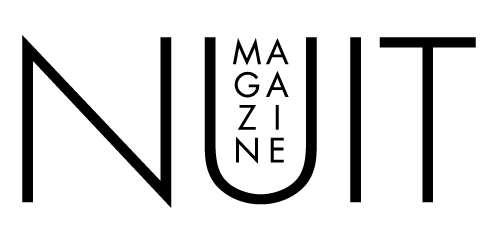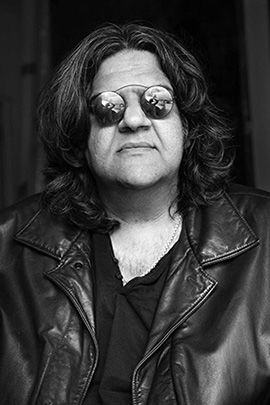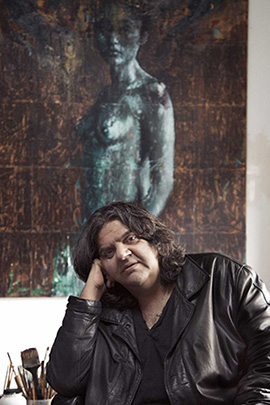 home
about
artists
exhibitions press
contact
purchase
home
about
artists
exhibitions press
contact
purchase |
|
|
AFSHIN NAGHOUNI
http://www.nuitmagazine.com/mag/afshinnaghouni/
Iranian born British artist Afshin Naghouni is a name to be reckoned with in the art world. Ash, as he is better known, started painting as a child, winning a number of regional and national competitions between the ages of nine and twelve. He doesn’t follow any particular style, but allows his paint brush to lead him into a world that has us questioning what we see. Out of Focus is a documentary by Shahriar Siami about the artist which was recently awarded San Francisco Film Festival’s Award of Merit. The film tells the story of how Ash fell down the seventh floor of a building during an escape from an Iranian police attack on a birthday party. He injured his spinal cord severely and ended up in wheelchair. Dena Tahmasebi sat down with the artist to talk about his creative journey and the tragedy that led him to triumph. You use magazine images and photography and incorporate them into your paintings to represent two opposites. What role do opposites play in the message you are trying to convey? Media has long been a rival to religion, as the opiate for the masses, images play a huge role in that. Images are everything; they affect our comprehension of the world and its events. The problem is that they portray a version of reality, which at best is through someone else’s eyes, and at worst are lined up before our eyes with an agenda. It is easy to just accept, be entertained and get distracted by what is presented to us on a surface level, and to not notice or even care about what you can find within those images with a bit more investigation and a thorough look. You wish to be known as an artist and not as an Iranian one. You say you don’t want to call yourself anything because that would be separating yourself from others. It’s the Jiddu Krishnamurti school of thought where he described labelling as being violent. At a time like now, doesn’t the label Iranian, work to your benefit as an artist and give you an edge? Art is a universal phenomenon, nationality doesn’t come into it. Yes of course I’m familiar with Krishnamurti, and his way of thinking has always made sense to me. I find that any arbitrary form of separation could not only breed violence, but also struggle over our petty differences and can and will distract us from the real things that really matter. In response to the second part of your question, I have to say that I don’t think that’s the case, and to be honest even if it is I couldn’t care less.
What made you agree to have this documentary made about you and why now? The desire and offers to do it have always been there, but the timing wasn’t right for me. I was first asked to talk about my experience 10-15 years ago, but I was in the early stages of my professional journey. I felt that I wanted to make a name for myself based on my work, based on what I do creatively, rather than this tragic story. I feel now the time is right to tell my story, all of it. How hard was it to have to go back to the night of your accident for this documentary? Would you believe me if I said it wasn’t hard at all?! I don’t know why, perhaps it’s because it happened so long ago, or maybe because I can’t remember much of it. However seeing my friends talking about that night made it all hit home. I realised that it wasn’t just my life that changed that night, but also that of my friends. They were deeply affected by the incident and everything around it. You mention in the documentary that, after the accident you were more worried about losing movement in your hands than in your legs. Your art was your priority even at the worst time of your life, that’s more than most feel about their profession. Is painting almost an addiction? Being creative is not something you choose, it’s something you just do because it’s in your nature. One doesn’t decide to become a professional artist, it’s usually the other way around. You keep creating and one day you earn enough money from it as a profession. In your work, you are painting beautiful layers on very ugly or hard truths. Where does that come from? Haha! Using the word “beautiful” is bit sacrilege in the art world, but you are right. We usually justify our actions by glorifying and prettifying them. Realities such as “invasion”, “ethnic cleansing”, “objectification”, “brutality and torture” are usually hidden behind concepts such as “liberation”, “right to defend” and “necessary force”. I like connecting with the viewer’s senses, the first point of connection is always the aesthetics. You are drawn in by beauty at first and hopefully if you take the time to look deeper you would start engaging conceptually too. Contrasting concepts are embedded within the pretty exterior. The universal soldier with pixilated face is a very strong piece. Your message there is that a soldier is a soldier, no matter what side he is fighting on. Do you remember when you first started painting it, and what inspired that piece? The message there is what you make of it. Having experienced war as a civilian, it has always been an important subject to me and it’s an ongoing project. I may work on other projects, but the subject of conflict and war always pops up unfortunately, and triggers something in me; whether it’s the invasion of Iraq, extermination of Palestinians or emergence of the likes of ISIS just to mention a few. Critics say you have a political voice now, what is that voice saying? I don’t know about that. It’s not about making statements, it’s more about questioning how we see things, and how we respond or react to them. Why nudes, why are you so drawn to painting the female body? Why not? It’s a subject that lends itself well to my concepts and the kind of contradictions that I like to explore in my work. My nudes are not just nudes, they are most of time the portrayal of “female beauty” according to media images. The figures, the way they pose and the way they look at you sometimes, even the composition of my canvases are in line with those in glossy magazines. The situation of women in the West and in the Islamic world seems very different which is true in most part, but there are profound similarities too. In both we have this image of “perfection” projected onto the society which dictates how women should look, dress and behave, to the point that nothing else is accepted. The only difference is in the portrayed image. Does your work happen organically, or do you plot your canvas ahead of time? I have a good idea what I’m going to do, a lot of things are determined in my head and sketches, but as soon as I start on a canvas things develop organically. What’s your creative process like, from an idea to a finished piece? How do you determine when a painting is finished? I don’t know if they are ever finished, it just comes to a point when I stop working on them. I’m always painting even when I’m not. I could be sitting there, appearing as if I am lost in daydreams for long periods of time, completely cut off from my surroundings, but I am in fact painting and juggling ideas in my head; sketching and experimenting ways of communicating those ideas going forward from there. Do you listen to music while you paint, and if so what? Always and no, you are not going to get me to reveal my guilty pleasures. But seriously, I listen to all sorts. If you listen to my playlists on Spotify you would think that it was put together by 5 different people. Do you collect any art yourself? I wouldn’t call it collecting but I have bought art in the past whenever I could afford things that I like. What’s next for Afshin Naghouni? Apart from my upcoming solo in June, nothing is planned. I really don’t know. I try to never plan ahead of time. I’m enjoying life and what I am doing creatively right now and my only long term plan is to carry on doing so, for as long as possible. Afshin Naghouni’s Exhibition Satire runs at Hay Hill Gallery, London, from 1-28 June.
Interview by Dena Tahmasebi |
|
|
|
E-mail: info@hayhillgallery.com |



